
|
February 25, 2012 - No. 8 Agenda of the Harper Government No U.S. Troops on Canadian Soil!
|
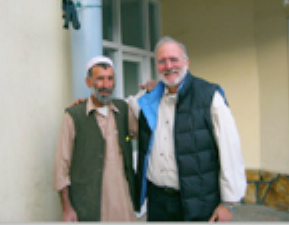 Alan Gross in Afghanistan. |
According to AP, the case has heightened frictions in
between the United States and Cuba, and raises questions about how far
"democracy-building programs"
have
gone -- and whether cloak-and-dagger work is better left to
intelligence
operatives.
Gross' company, JBDC Inc., which specializes in setting up Internet access in remote locations like Iraq and Afghanistan, had been hired by Development Alternatives Inc., or DAI, of Bethesda, Maryland, which had a multimillion-dollar contract with USAID to break Cuba's information blockade by "technological outreach through phone banks, satellite Internet and cell phones."
USAID officials reviewed Gross' trip reports and
received regular briefings
on his progress, according to DAI spokesman Steven O'Connor. The
reports
were made available to the AP by a person familiar with the case who
insisted
on anonymity because of the documents' sensitivity.
The reports cover four visits over a five-month period in 2009. Another report, written by a representative of Gross' company, covered his fifth and final trip, the one that ended with his arrest on December 3, 2009.
Together, the reports detail the lengths to which Gross went to escape Cuban authorities' detection.
To avoid airport scrutiny, Gross enlisted the help of other American Jews to bring in electronic equipment a piece at a time. He instructed his helpers to pack items, some of them banned in Cuba, in carry-on luggage, not checked bags.
He once drove seven hours after clearing security and customs rather than risk airport searches.
On his final trip, he brought in a "discreet" SIM card -- or subscriber identity module card -- intended to keep satellite phone transmissions from being pinpointed within 250 miles (400 kilometers), if they were detected at all.
The type of SIM card used by Gross is not available on the open market and is distributed only to governments, according to an official at a satellite telephone company familiar with the technology and a former U.S. intelligence official who has used such a chip. The officials, who spoke on condition of anonymity because of the sensitivity of the technology, said the chips are provided most frequently to the Defense Department and the CIA, but also can be obtained by the State Department, which oversees USAID.
Asked how Gross obtained the card, USAID spokesman Drew Bailey said only that the agency played no role in helping Gross acquire equipment. "We are a development agency, not an intelligence agency," he said.
Gross' American lawyer, Peter J. Kahn, declined comment but has said in the past that Gross' actions were not aimed at subverting the Cuban government.
Proponents of providing Internet access say it can undermine authoritarian governments that control the flow of information to their people. Critics say the practice not only endangers contractors like Gross, but all American aid workers, even those not involved in secret activities.
"All too often, the outside perception is that these USAID people are intelligence officers," said Philip Giraldi, an ex-CIA officer. "That makes it bad for USAID, it makes it bad for the CIA and for any other intelligence agency who like to fly underneath the radar."
Even before he delivered the special SIM card, Gross noted in a trip report that use of Internet satellite phones would be "problematic if exposed." He was aware that authorities were using sophisticated detection equipment and said he saw workers for the government-owned telecommunications service provider conduct a radio frequency "sniff" the day before he was to set up a Wi-Fi operation.
While the U.S. government broadly outlines the goals of its aid programs in publicly available documents, the work in Cuba could not exist without secrecy because it is illegal there. Citing security concerns, U.S. agencies have refused to provide operational details even to congressional committees overseeing the programs.
 USAID
rejected
the
notion
that
its
contractors perform
covert work.
USAID
rejected
the
notion
that
its
contractors perform
covert work.
"Nothing about USAID's Cuba programs is covert or classified in any way," says Mark Lopes, a deputy assistant administrator. "We simply carry out activities in a discreet manner to ensure the greatest possible safety of all those involved."
The U.S. National Security Act defines "covert" as government activities aimed at influencing conditions abroad "where it is intended that the role of the United States Government will not be apparent or acknowledged publicly."
USAID's democracy promotion work in Cuba was spurred by a large boost in funding under the Bush administration and a new focus on providing communications technology to Cubans. U.S. funding for Cuban aid multiplied from $3.5 million in 2000 to $45 million in 2008. It's now $20 million.
Gross was paid a half-million dollars as a USAID subcontractor, according to U.S. officials familiar with the contract. They spoke only on condition of anonymity because they are not authorized to discuss the case.
USAID head Raj Shah said democracy promotion is "absolutely central" to his agency's work. The Obama administration says its Cuba programs aim to help politically repressed citizens enjoy fundamental rights by providing humanitarian support, encouraging democratic development and aiding the free flow of information.
U.S. officials say Gross' work was not subversion because he was setting up connections for Cuba's Jewish community, not for dissidents. Jewish leaders have said that they were unaware of Gross' connections to the U.S. government and that they already were provided limited Internet access. USAID has not said why it thought the community needed such sensitive technology.
Asked if such programs are meant to challenge existing leaders, Lopes said, "For USAID, our democracy programs in Cuba are not about changing a particular regime. That's for the Cuban people to decide, and we believe they should be afforded that choice."
Others disagree.
"Of course, this is covert work," said Robert Pastor, President Jimmy Carter's national security advisor for Latin America and now director of the Center for Democracy and Election Management at American University in Washington. "It's about regime change."
Gross, of Potomac, Maryland, is a gregarious man, about 6 feet (1.8 meters) and 250 pounds (113 kilograms). He is hard to miss. He had bought a Rosetta Stone language course to improve his rudimentary Spanish and had scant knowledge of Cuba. But he knew technology. His company specialized in installing communications gear in remote parts of the world.
Gross' first trip for DAI, which ended in early April
2009, focused on
getting equipment in and setting up the first of three facilities with
Wi-Fi
hotspots that would give unrestricted Internet access to hundreds of
Cubans,
especially the island's small Jewish community of 1,500, AP reports.
To get the materials in, Gross relied on American Jewish humanitarian groups doing missions on the island. He traveled with the groups, relying on individuals to help bring in the equipment, according to the trip reports.
Three people briefed on Gross' work say he told contacts in Cuba he represented a Jewish organization, not the U.S. government. USAID says it now expects people carrying out its programs to disclose their U.S. government funding to the people they are helping -- if asked.
One of Gross' reports suggests he represented himself as a member of one of the groups and that he traveled with them so he could intercede with Cuban authorities if questions arose.
The helpers were supposed to pack single pieces of equipment in their carry-on luggage. That way, Gross wrote, any questions could best be handled during the X-ray process at security, rather than at a customs check. The material was delivered to Gross later at a Havana hotel, according to the trip reports.
USAID has long relied on visitors willing to carry in prohibited material, such as books and shortwave radios, U.S. officials briefed on the programs say. And USAID officials have acknowledged in congressional briefings that they have used contractors to bring in software to send encrypted messages over the Internet, according to participants in the briefings.
An alarm sounded on one of Gross' trips when one of his associates tried to leave the airport terminal; the courier had placed his cargo -- a device that can extend the range of a wireless network -- into his checked bag.
Gross intervened, saying the device was for personal use and was not a computer hard drive or a radio.
According to the trip reports, customs officials wanted to charge a 100 percent tax on the value of the item, but Gross bargained them down and was allowed to leave with it.
"On that day, it was better to be lucky than smart," Gross wrote.
Much of the equipment Gross helped bring in is legal in Cuba, but the volume of the goods could have given Cuban authorities a good idea of what he was up to.
"Total equipment" listed on his fourth trip included 12 iPods, 11 BlackBerry Curve smartphones, three MacBooks, six 500-gigabyte external drives, three Internet satellite phones known as BGANs, three routers, three controllers, 18 wireless access points, 13 memory sticks, three phones to make calls over the Internet, and networking switches. Some pieces, such as the networking and satellite equipment, are explicitly forbidden in Cuba.
Gross wrote that he smuggled the BGANs in a backpack. He had hoped to fool authorities by taping over the identifying words on the equipment: "Hughes," the manufacturer, and "Inmarsat," the company providing the satellite Internet service.
The BGANs were crucial because they provide not only satellite telephone capacity but an Internet signal that can establish a Wi-Fi hotspot for multiple users. The appeal of using satellite Internet connections is that data goes straight up, never passing through government-controlled servers.
There was always the chance of being discovered.
Last year, the Senate Foreign Relations Committee asked about clandestine methods used to hide the programs and reports that some of them had been penetrated.
"Possible counterintelligence penetration is a known risk in Cuba," the State Department said in a written response to AP. "Those who carry out our assistance are aware of such risks."
Gross' first trip to Cuba ended in early April 2009 with establishment of a communications site in Havana.
He went back later that month and stayed about 10 days while a site was set up in Santiago, Cuba's second-largest city.
On his third trip, for two weeks in June 2009, Gross traveled to a city in the middle of the island identified by a U.S. official as Camaguey. He rented a car in Havana and drove seven hours rather than risk another encounter with airport authorities.
Gross wrote that BGANs should not be used outside Havana, where there were enough radio frequency devices to hide the emissions.
The report for Gross's fourth trip, which ended early that August, was marked final and summarized his successes: wireless networks established in three communities; about 325 users; "communications to and from the U.S. have improved and used on a regular basis." He again concluded the operation was "very risky business."
Gross would have been fine if he had stopped there.
In late November 2009, however, he went back to Cuba for a fifth time. This time he didn't return. He was arrested 11 days later.
An additional report was written afterward on the letterhead of Gross' company. It was prepared with assistance from DAI to fulfill a contract requirement for a summary of his work, and so everyone could get paid, according to officials familiar with the document.
The report said Gross had planned to improve security of the Havana site by installing an "alternative sim card" on the satellite equipment.
The card would mask the signal of the BGAN as it transmitted to a satellite, making it difficult to track where the device was located.
The document concluded that the site's security had been increased.
It is unclear how DAI confirmed Gross' work for the report on the final trip, though a document, also on Gross' company letterhead, states that a representative for Gross contacted the Jewish community in Cuba five times after his arrest.
In a statement at his trial, Gross professed his innocence and apologized.
"I have never, would never and will never purposefully or knowingly do anything personally or professionally to subvert a government," he said. "I am deeply sorry for being a trusting fool. I was duped. I was used."
In an interview with AP, his wife, Judy, blamed DAI, the company that sent him to Cuba, for misleading him on the risks. DAI spokesman O'Connor said in a statement that Gross "designed, proposed, and implemented this work" for the company.
(Cubaminrex)
The Cases of Alan Gross and the Cuban Five
The way may be opening for increased U.S.-Cuban ties. The United States has removed all restrictions on Cuban-American travel from the U.S. to Cuba and all limitations on Cuban-American remittances to families on the island. Coming at a time when the Cuban government is encouraging the establishment of small private enterprises, this opens the way for importantly increased ties between the two communities-as one observer put it: "for an inflow of capital from the U.S. to Cuba."
There is, however, the proverbial "fly in the ointment" and that is the case of Alan Gross, arrested on December 3 of 2009 and since then representing a major obstacle to improved relations -- along with the case of the Cuban Five on the other side (but more on that later).
Who Is Alan Gross?
Alan Gross is a 61 year-old Jewish U.S. citizen from Potomac, Maryland who is an employee of Development Alternatives, Inc. (DAI), a subcontractor of the U.S. Agency for International Development (USAID) which itself is a dependency of the State Department. In December 2009, when Gross was about to leave Cuba with a simple tourist visa-after his fifth visit that year -- Cuban state security authorities detained him at the International Airport in Havana. An investigation discovered links between him and the internal opposition to the Cuban government. Gross had been distributing among the opposition portable computers and satellite telephones as part of the State Department program for "promoting democracy in Cuba."[1]
A long-distance communications technology expert, Gross has great experience in the field. He has worked in more than 50 nations and set up satellite communications systems during the military interventions in Iraq and Afghanistan to circumvent channels controlled by local authorities.[2]
Possession of a satellite phone is strictly forbidden in Cuba for national security reasons and telecommunications are a state monopoly with competition forbidden.[3]
Aid for the Cuban Jewish Community?
The State Department, demanding the release of the detainee declared, "Gross works for international development and traveled to Cuba to assist the members of the Jewish community in Havana to connect with other Jewish communities in the world." According to Washington, Gross' activities were legitimate and did not violate Cuban legislation.[4]
In October 2010, during the annual session of the UN General Assembly, Arturo Valenzuela, then assistant secretary of state for inter-American affairs, met with Bruno Rodríguez, Cuban minister for foreign affairs, to discuss Gross. This was the most important diplomatic meeting between representatives from both nations since the beginning of Obama's era.[5]
Alan Gross' family also said that his frequent trips to the island were to allow the Jewish community in Havana to gain access to the Internet and to communicate with Jews all over the world.[6] His lawyer, Peter J. Kahn, endorsed their words, "His work in Cuba had nothing to do with politics; it was simply aimed at helping the small, peaceful, non-dissident Jewish community in the country."[7]
Gross doubtless had contact with some members of the Jewish community in Cuba. Leaders of the Jewish community in Havana, however, contradict the official U.S. version of his relationship. In fact, leaders of the community affirm they did not know Alan Gross, and had never met with him despite his five visits to Cuba in 2009. Adela Dworin, president of the Beth Shalom Temple, rejected Washington's statements. "It's lamentable [...]. The saddest part is that they tried to involve the Jewish community in Cuba which has nothing to do with this."
Mayra Levy, speaker of the Sephardic Hebraic Center, declared she didn't know who Gross was and added he had never been to her institution. The Associated Press said "the leaders of the Jewish community in Cuba denied the American contractor Alan Gross [...] had collaborated with them."[8] In like manner, the Jewish Telegraphic Agency reported that "the main Jewish groups in Cuba had denied having any contracts with Alan Gross or any knowledge of his project."[9]
Reverend Oden Mariachal, secretary of the Consejo de Iglesias de Cuba (CIC) [Cuban Council of Churches] which includes the [non-Catholic] Christian religious institutions and the Jewish community in Cuba, confirmed this position at a meeting with Peter Brennan, State Department coordinator for Cuban Affairs. On the occasion of the General Assembly of Churches of Christ in the U.S., held in Washington in 2010, the religious leader rejected Gross' allegations. "What we made clear is what the Cuban Jewish Community, a member of the Cuban Council of Churches, told us, 'We never had a relationship with that gentleman; he never brought us any equipment.' They denied any kind of relationship with Alan Gross."[10]
In fact, the small Cuban Jewish community, far from isolated, is perfectly integrated in society and has excellent relations with the political authorities in the Island. Fidel Castro, although very critical of Israeli policy in the occupied territories, declared to American journalist Jeffrey Goldberg that in history "no one has been as slandered as the Jews. They were exiled from their land, persecuted and mistreated everywhere in the world. The Jews had a more difficult existence than ours. Nothing can compare to the Holocaust," he said.[11]
Cuban President Raúl Castro attended the religious ceremony for Hanukkah -- the Festival of Lights -- at the Shalom Synagogue in Havana, in December 2010. The visit was broadcast live on Cuban TV and published in the front page of newspaper Granma. He took the opportunity to greet "the Cuban Jewish community and the fabulous history of the Hebrew people."[12]
Moreover, the Cuban Jewish community has all the technological facilities needed to communicate with the rest of the world, thanks to the assistance of other international Jewish entities such as the B'nai Brith and the Cuban Jewish Relief Project, the Canadian Jewish Congress (CJC), the World ORT, the Joint Distribution Committee (JDC) or the United Jewish Committee (UJC); all of it endorsed by the Cuban authorities.[13]
Arturo López-Levy, B'nai Brith secretary for the Cuban Jewish community between 1999 and 2001, and today a professor at Denver University, is also skeptical about the U.S. version of the Gross case. On the subject, he stated, "Gross was not arrested for being Jewish or for his alleged activities of technological aid to the Cuban Jewish community which already had an informatics lab, electronic mail and Internet access before he got to Havana. [The Jews in Cuba] do not gather at a synagogue to conspire with the political opposition because this would jeopardize their cooperation with the government which is needed for their activities: the emigration to Israel program, the Right by Birth project -- through which young Cuban Jews travel to Israel every year -- or to deal with humanitarian aid. To protect the most important they detach themselves as much as possible from the U.S. programs of political interference on Cuban internal affairs. Gross travelled to Cuba not to work with any Jewish organization but for USAID."[14]
Wayne S. Smith, chief of the U.S. Interests Section in Cuba from 1979 to 1982 and director of Cuba Program of the Center for International Policy in Washington, said that "in other words, Gross was involved in a program whose intentions were clearly hostile to Cuba, because its objective is nothing less than regime change."[15]
Illegal Activities According to Cuban Authorities
Cuban authorities suspected Gross of espionage and internal subversion activities.[16] Ricardo Alarcon, president of the Cuban Parliament, declared he had violated the country's legislation. "He violated Cuban laws, national sovereignty, and committed crimes that in the U.S. are most severely punished."[17]
Gross, a USAID employee, was providing sophisticated communications equipment. The distribution and use of satellite phones is regulated in Cuba and it is forbidden to import them without authorization. On the other hand, Article 11 of Cuban Law 88 reads that, "He who, in order to perform the acts described in this Law, directly or through a third party, receives, distributes or takes part in the distribution of financial means, material or of other kind, from the Government of the United States of America, its agencies, dependencies, representatives, officials, or from private entities is liable to prison terms from 3 to 8 years."[18]
This severity is not unique to Cuban legislation. U.S. law prescribes similar penalties for this type of crime. The Foreign Agents Registration Act prescribes that any un-registered agent "who requests, collects, supplies or spends contributions, loans, money or any valuable object in his own interest" may be liable to a sentence of five years in prison and a fine of 10,000 dollars.[19]
French legislation also punishes this type of action. According to Article 411-8 of the Penal Code, "the act of exercising on behalf of a foreign power, a foreign company or organization or company or organization under the control of a foreign agent, any act aimed at supplying devices, information, procedures, objects, documents, informatics data or files whose exploitation, spreading, or gathering can by nature attempt against the fundamental interests of the nation is punishable with ten years of imprisonment and a fine of 150,000 Euros."[20]
On February 4, 2011, the prosecutor of the Republic of Cuba formally accused Alan Gross of "acts against the integrity and independence of the nation," and demanded a jail sentence of 20 years. On March 12, 2011 Gross was finally sentenced to 15 years imprisonment after his trial.[21] The lawyer for the defense, Peter J. Kahn, expressed his regret that his client was "caught in the middle of a long political dispute between Cuba and the United States."[22]
The New York Times remembers that Gross "was arrested last December during a trip to Cuba as part of a semi-clandestine USAID program, a service of foreign aid of the State Department destined to undermine the Cuban Government," The New York paper also indicated that "U.S. authorities have admitted that Mr. Gross entered Cuba without the appropriate visa and have said he distributed satellite telephones to religious groups."[23]
Since 1992 and the adoption of the Torricelli Act, the U.S. openly admits its objective towards Cuba is "regime change" and one of the pillars of this policy is to organize, finance and equip an internal opposition.[24]
USAID, which is in charge of the implementation of the plan, admits that, as part of this program, it finances the Cuban opposition. According to the Agency, for the 2009 fiscal year the amount destined for aid to Cuban dissidents was 15.62 million dollars. Since 1996 a total of 140 million dollars have been dedicated to the program aimed at overthrowing the Cuban government. "The largest part of this figure is for individuals inside Cuba. Our objective is to maximize the amount of the support that benefits the Cubans in the Island."[25]
The government agency also stresses the following, "We have trained hundreds of journalists in a ten year period and their work is seen in mainstream international media." Formed and paid by the U.S., they represent, above all, the interests of Washington whose objective is a "regime change" on the island.[26]
From a juridical point of view, this reality in fact places the dissidents who accept the emoluments offered by USAID in the position of being agents at the service of a foreign power, which constitutes a serious violation of the Cuban Penal Code. The agency is aware of this reality and simply reminds all that "nobody is obliged to accept or be part of the programs of the government of the United States."[27]
Judy Gross, the wife of Alan Gross, was authorized to visit him in prison for the first time in July 2010.[28] She took the occasion to send a letter to Cuban President Raúl Castro in which she expressed her repentance and apologized for the acts of her husband. "I understand today the Cuban Government does not appreciate the type of work Alan was doing in Cuba. His intention was never to hurt your government."[29]
Judy Gross also accuses the State Department of not having explained to her husband that his activities were illegal in Cuba. "If Alan had known that something would happen to him in Cuba, he would not have done that. I think he was not clearly informed about the risks."[30]
A Way Out?
Clearly, Alan Gross violated the law. Of that there can be no doubt. On the other hand, he seems to have done little harm. His continued incarceration results in no important benefits to the U.S. His release, on the other hand, could be a major step toward improved U.S.-Cuban relations, especially if in the process he were prepared to apologize for his actions.
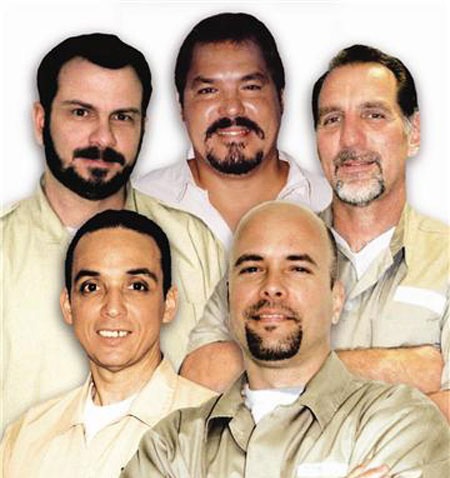 There is another side to
the matter, however, and that
has to do with the
so-called Cuban Five. Just as the U.S. seems unwilling to move ahead in
relations unless there is some movement in the Gross case, so do the
Cubans
seem reluctant to move without progress in the case of the Cuban Five,
who
were incarcerated in 1998. They were sent up to the U.S. by the Cuban
government to penetrate and develop information about the anti-Castro
terrorists groups in Florida after a sequence of bomb attacks against
tourist
centers in Havana. The idea was then to provide that information to the
FBI
so that it could take action to halt the exile terrorists. A meeting
between
representatives of the FBI and the Cubans was held in Havana over
several
days in June of 1998 and some forty folders of evidence were turned
over to
the FBI. The Cubans then waited for the U.S. to take action against the
terrorists. But none was taken; rather, shortly thereafter, the FBI
began
arresting the Cuban five. In other words, they arrested those who had
provided
the evidence rather than the terrorists themselves. The Five were
arrested, tried
and convicted, though "tried" is not the right word for the trial was a
sham.
The prosecutors had no real evidence and so fell back on the old
standby of
trying them for "conspiracy" to commit illegal acts. No evidence, and
they
were tried in Miami where anti-Castro sentiment had reached such a
level with
the Elian Gonzalez case that there was no chance of empanelling an
impartial
jury. Defense lawyers requested a change of venue, but, incredibly, it
was
denied.
There is another side to
the matter, however, and that
has to do with the
so-called Cuban Five. Just as the U.S. seems unwilling to move ahead in
relations unless there is some movement in the Gross case, so do the
Cubans
seem reluctant to move without progress in the case of the Cuban Five,
who
were incarcerated in 1998. They were sent up to the U.S. by the Cuban
government to penetrate and develop information about the anti-Castro
terrorists groups in Florida after a sequence of bomb attacks against
tourist
centers in Havana. The idea was then to provide that information to the
FBI
so that it could take action to halt the exile terrorists. A meeting
between
representatives of the FBI and the Cubans was held in Havana over
several
days in June of 1998 and some forty folders of evidence were turned
over to
the FBI. The Cubans then waited for the U.S. to take action against the
terrorists. But none was taken; rather, shortly thereafter, the FBI
began
arresting the Cuban five. In other words, they arrested those who had
provided
the evidence rather than the terrorists themselves. The Five were
arrested, tried
and convicted, though "tried" is not the right word for the trial was a
sham.
The prosecutors had no real evidence and so fell back on the old
standby of
trying them for "conspiracy" to commit illegal acts. No evidence, and
they
were tried in Miami where anti-Castro sentiment had reached such a
level with
the Elian Gonzalez case that there was no chance of empanelling an
impartial
jury. Defense lawyers requested a change of venue, but, incredibly, it
was
denied.
Worst of all was the case of Gerardo Hernandez, who was accused of "conspiracy" to commit murder and given two consecutive life sentences plus fifteen years-this in connection with the shoot down of the two Brothers to the Rescue planes in February of 1996. Never mind that there was no evidence that he was in any way responsible. But there, behind bars, he remains today, mostly in solitary confinement and after all these years not allowed a single visit from his wife.
The injustice in these cases contradicts the reputation of the U.S. for dedication to the rule of law. It must be corrected. Holding these men year after year without real evidence of any crime other than being the unregistered agents of a foreign power was one thing during the Cold War -- though unjustified even then. But now, with the Cold War over and every possibility of beginning a new U.S.-Cuba relationship, it becomes morally unjustifiable and counterproductive. It is time surely to undertake a process of reviewing all these cases and then allowing these men to return to their families. One, René Gonzalez, has already been released from prison to serve out his remaining three years on parole, but at the same time, incredibly, not allowed to return to Cuba to be with his wife, who he has not seen in all these years. That, allowing his return, should perhaps be the first step in the process.
And it goes without saying that as the U.S. begins to move in the cases of the Cuban Five, Cuba should release Alan Gross to return to his family.
It should be noted that Alan Gross himself suggested there should be some reciprocal movement in these cases. "Following the recent exchange of the Israeli soldier, Gilad Shalit, for 1,000 Palestinian prisoners, Gross was clear that he wants the United States and Cuba to make a similar gesture for him and the Cuban Five," explained Rabbi David Shneyer, who had visited Gross in Havana.[31]
Salim Lamrani, PhD in Iberian and
Latin American
Studies
of the Paris
Sorbonne-Paris IV University, is a professor in charge of courses at
the
Paris-Sorbonne-Paris IV University and the Paris- Est Marne-la-
VallÚe
University. He is a French journalist, and specialist on the
Cuba-United States
relations. He has recently published: Etat de siege. Les sanctions
economiques
des Etats-Unis contre Cuba with a prologue by Wayne S. Smith.
Wayne S. Smith, now director of the Cuba Project at the
Center for
International Policy, was chief of the U.S. Interests Section in
Havana,
1979-1982, and is the author of The Closest of Enemies, (New York: W.W.
Norton, 1987).
End Notes
1. Jeff Franks, Reuter, October
24, 2010.
2. Phillip J. Crowley, op. cit.; Saul
Landau, Counterpunch, July 30, 2010.
http://www.counterpunch.org/landau07302010.html (site consulted on
February
18, 2011).
3. Ibid.
4. Phillip J. Crowley, op. cit
5. Paul Haven, The Associated Press,
October 18, 2010
6. Anthony Broadle, Reuters, October 24,
2010.
7. Juan O. Tamayo, El Nuevo Herald,
February
5,
2011.
8. Andrea Rodríguez, The
Associated Press, December 2, 2010.
9. Jewish Telegraphic Agency, February 6,
2011.
10. Andrea Rodrígues, The
Associated Press, December 2, 2010.
11. Jeffrey Goldberg, The Atlantic,
December
7,
2010.
http://www.theatlantic.com/international/archive/2010/09/castro-
no-one-has-been-slandered-more-than-tthe-jews/62566/
(site
consulted
on
February
18,
2011).
12. The Associated Press, Juan O. Tamayo,
El Nuevo Herald, December
6, 2010.
13. Comunidad Hebrea de Cuba,
http://www.chcuba.org/espanol/ayuda/quienes.htm (site consulted on
February
18, 2011).
14. Arturo López-Levy, August
2010.
http://www.thewashintonnote.com/archives/2010/08freeing_alan_gr/ (site
consulted on February 18, 2011).
15. Wayne S. Smith, Center for
International Policy, March 2011.
http://ciponline.org/pressroom/articles/030411_Smith_Intelligence
_Brief_Gross.htm (site consulted on March 13, 2011).
16. Paul Haven, The Associated Press,
February 19, 2010.
17. Andrea Rodriguez, The Associated
Press, December 11, 2010.
18. Ley de protección de la
independencia nacional y la economía de Cuba
(LEY N . 88), Artículo 11.
19. U.S. Code, Title 22, Chapter 11,
Subchapter II, 611, iii 618, a, 1
>.
20. Code Penal, Partie legislative,
Livre, Titre Ier, Chapitre I, Section 3,
Article 411-8.
21. William Booth, The Associated Press,
February 4, 2011.
22. Paul Haven The Associated Press,
February 4, 2011.
23. Ginger Thompson, The New York
Times, October 24,
2010.
24. Cuban Democracy Act, Titulo XVII,
Artículo 1705, 1992.
25. Along the Malecon, October 25, 2010.
http://alongthemalecon.blogspot.com/2010/10/exclusive-
q-with-usaid.html (site
consulted on October 26, 2010); Tracey Eaton, El Nuevo Herald, December
3, 2010.
26. Ibid.
27. Ibid.
28. Jessica Gresko, The Associated Press,
October 26, 2010.
29. Anthony Boadle, op. cit. Jeff Frank,
Reuters, October 24, 2010.
30.Anthony Boadle, op. cit EFE, February
8, 2011.
31. Agence France Presse, November 8,
2011.
(Cubaminrex/CIP)
Read The Marxist-Leninist Daily
Website: www.cpcml.ca
Email: editor@cpcml.ca
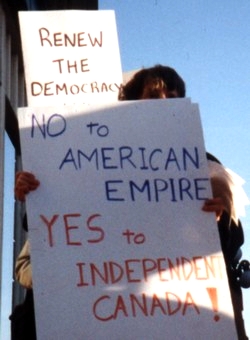
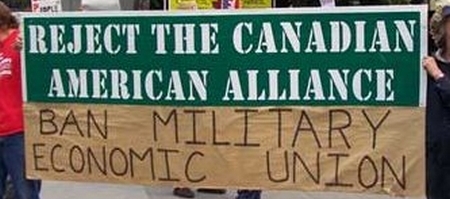
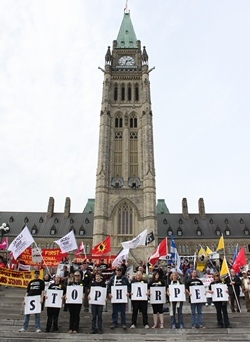 A troubling aspect of the Harper
government's agenda are
the new
arrangements being put in place to make permanent the placement of U.S.
troops and security agencies on Canadian soil, as well as to integrate
the
command of the Canadian military with that of the U.S. This includes
integrating the Canadian military with civilian agencies which then
come under
the joint command structures. These arrangements are being put in place
by the two militaries with the approval of the Harper government which
justifies it all in the name of "security," including having the
military secure the economy of North America.
A troubling aspect of the Harper
government's agenda are
the new
arrangements being put in place to make permanent the placement of U.S.
troops and security agencies on Canadian soil, as well as to integrate
the
command of the Canadian military with that of the U.S. This includes
integrating the Canadian military with civilian agencies which then
come under
the joint command structures. These arrangements are being put in place
by the two militaries with the approval of the Harper government which
justifies it all in the name of "security," including having the
military secure the economy of North America.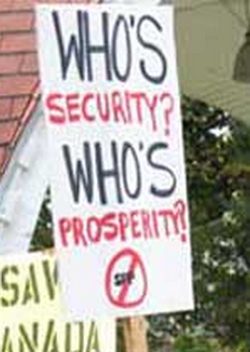 He then outlined how the
renewal of the CAP and the CDP
are part of ensuring the continental economy continues to be
"secure" in
the face of any threats, and that this involves working directly with
civilian
agencies. Speaking to the significance of the renewal of the CAP,
MacKay
stated that the agreement: "[...] is valuable because it permits the
rapid
deployment of military personnel and assets to respond to humanitarian
events.
In the event of floods, forest fires, hurricanes, earthquakes, or to
assist in the
aftermath of a terrorist attack -- military members from one nation
will be
ready to support the armed forces of the other, all supporting lead
civilian
agencies." Speaking about the CDP, MacKay stated:
"This
agreement provides a framework for the combined defence of Canada and
the
U.S. during peace, contingencies, and war."
He then outlined how the
renewal of the CAP and the CDP
are part of ensuring the continental economy continues to be
"secure" in
the face of any threats, and that this involves working directly with
civilian
agencies. Speaking to the significance of the renewal of the CAP,
MacKay
stated that the agreement: "[...] is valuable because it permits the
rapid
deployment of military personnel and assets to respond to humanitarian
events.
In the event of floods, forest fires, hurricanes, earthquakes, or to
assist in the
aftermath of a terrorist attack -- military members from one nation
will be
ready to support the armed forces of the other, all supporting lead
civilian
agencies." Speaking about the CDP, MacKay stated:
"This
agreement provides a framework for the combined defence of Canada and
the
U.S. during peace, contingencies, and war."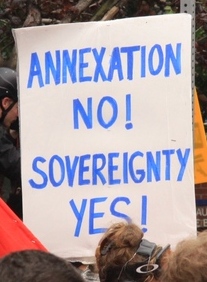 "This has already been done
to a certain degree, but
there is still room for
more integrated collaboration -- domestically and bi-nationally.
"This has already been done
to a certain degree, but
there is still room for
more integrated collaboration -- domestically and bi-nationally.
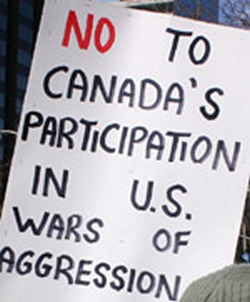 The document is a striking admission that the
Harper
government is openly
handing Canada over to the U.S. imperialists and facilitating U.S.
military
control over Canada. It also exposes the extent to which the U.S.
military has
fully infiltrated the Canadian forces at the highest command levels,
not only
through the placement of U.S. military officials in Canada, but also
through
the integration of Canadian military commanders into the U.S. military
apparatus.
The document is a striking admission that the
Harper
government is openly
handing Canada over to the U.S. imperialists and facilitating U.S.
military
control over Canada. It also exposes the extent to which the U.S.
military has
fully infiltrated the Canadian forces at the highest command levels,
not only
through the placement of U.S. military officials in Canada, but also
through
the integration of Canadian military commanders into the U.S. military
apparatus.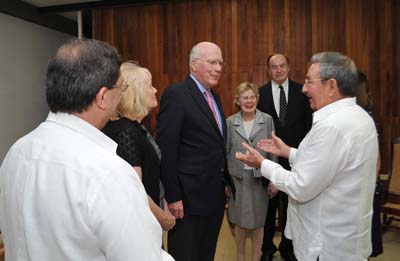 On February 23, Cuban
President Raúl Castro Ruz
received Democratic
Senator Patrick Leahy of Vermont, President of the U.S. Senate
Judiciary
Committee, and Republican Senator Richard Shelby, ranking member of the
Senate Committee on Banking, Housing and Urban Affairs. Accompanying
Castro was Foreign Minister Bruno Rodríguez Parrilla.
On February 23, Cuban
President Raúl Castro Ruz
received Democratic
Senator Patrick Leahy of Vermont, President of the U.S. Senate
Judiciary
Committee, and Republican Senator Richard Shelby, ranking member of the
Senate Committee on Banking, Housing and Urban Affairs. Accompanying
Castro was Foreign Minister Bruno Rodríguez Parrilla.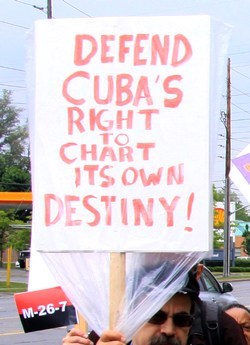 Piece by piece, in backpacks
and carry-on bags, American
aid contractor
Alan Gross made sure laptops, smartphones, hard drives and networking
equipment were secreted into Cuba. The most sensitive item, according
to
official trip reports, was the last one: a specialized mobile phone
chip that
experts say is often used by the Pentagon and the CIA to make satellite
signals
virtually impossible to track.
Piece by piece, in backpacks
and carry-on bags, American
aid contractor
Alan Gross made sure laptops, smartphones, hard drives and networking
equipment were secreted into Cuba. The most sensitive item, according
to
official trip reports, was the last one: a specialized mobile phone
chip that
experts say is often used by the Pentagon and the CIA to make satellite
signals
virtually impossible to track.